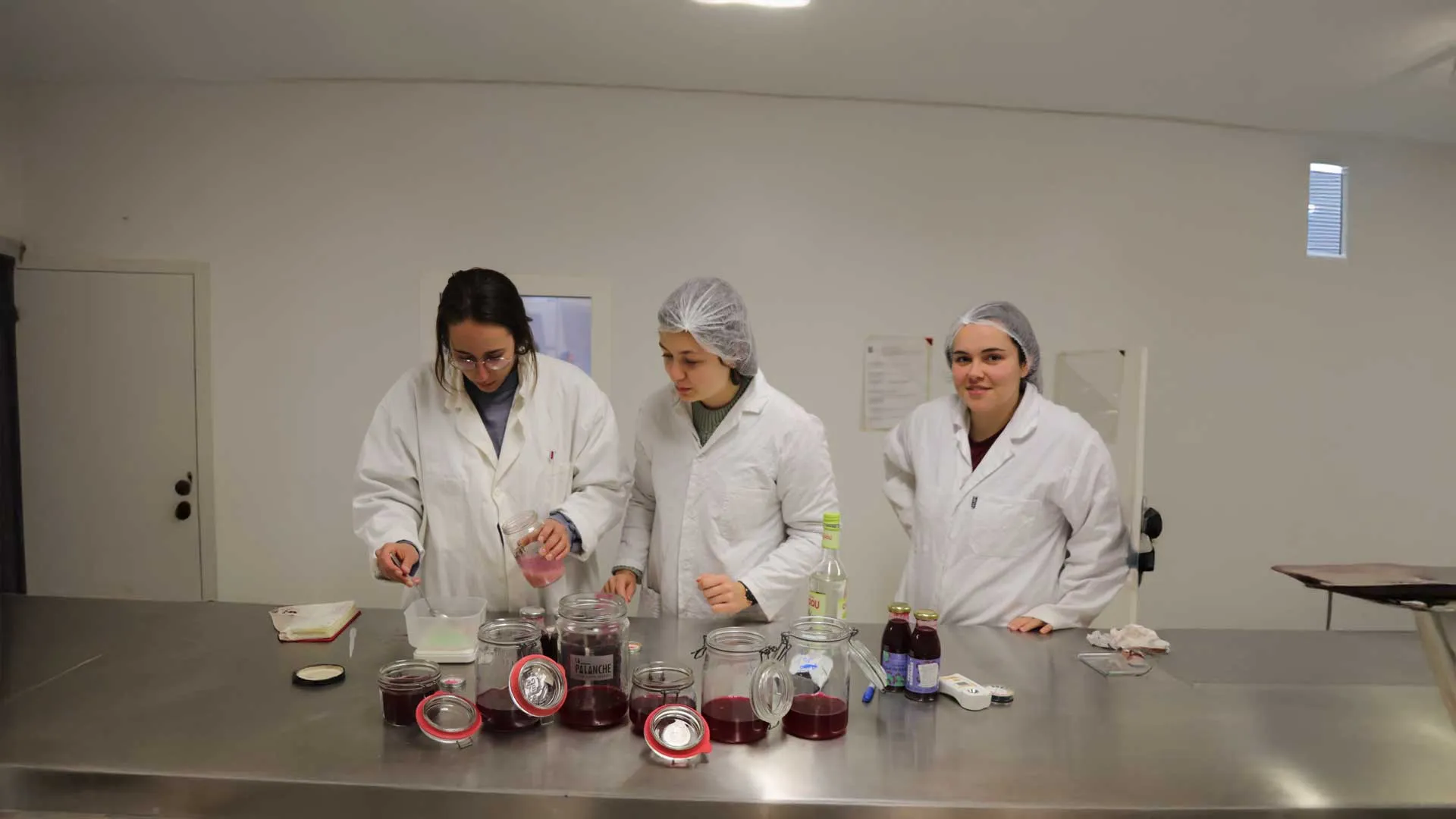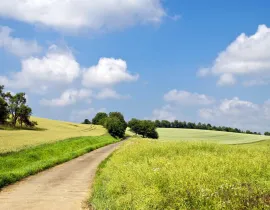Discover the cutting-edge research shaping the future at Institut Agro Montpellier. Our multidisciplinary laboratories are driving progress in agroecology, food systems, digital innovation, and sustainable resource management. Thinking about an internship or a PhD opportunity at Institut Agro Montpellier? Start your journey here.
L'Institut Agro Montpellier in brief:
- 20 multi-disciplinary Joint Research Units (JRU) laboratories, focusing on research thematics crucial to our current and tomorrow societies.
- Fundamental and applied research with professional partners to transform our future practices.
- Multiple research partners : INRAE, CNRS, CIRAD, IRD for projects in countries from the Northern and Southern hemisphere.
- To work on transitions in the fields of agro-ecological, digital, food, resource management and preservation
Interested in an internship or PhD thesis at Institut Agro Montpellier ? Get in touch with the professors and lecturers of the Joint Research Units–JRU below.
Water, soil & biodiversité
JRU Eco&Sols - Functional Ecology and Biogeochemistry of Soils
The work carried out at Eco&Sols aims to improve our understanding of the role of soil and plant organisms, and the interactions between them and with their environment, in biogeochemical cycles - mainly the C, N and P cycles - within soils and agro-ecosystems.
- Website: UMR Eco&Sols
- Location: Campus de la Gailarde
- Laboratory Director: Isabelle Bertrand, isabelle.bertrand@inrae.fr
- Institut Agro contacts: claire.marsden@supagro.fr, chiara.pistocci@supagro.fr, brigitte.brunel@supagro.fr
JRU LISAH - Soil-Agrosystem-Hydrosystem Interaction Laboratory
LISAH studies the complex workings of cultivated landscapes, focusing on interactions between plant production and natural resources (soil, water), on multi-actor and multi-object spaces (agricultural plots and landscape infrastructures), and within a critical zone (from surface water tables to the lower atmosphere).
- Website: UMR Lisah
- Location: Campus de la Gaillarde
- Laboratory Director: Jean-Stephane Baily, bailly@agroparistech.fr
- Institut Agro contacts: Julien.fouche@supagro.fr
JRU G-EAU - Water Management, Actors and Uses
G-EAU conducts research on the trajectories of socio-hydrosystems and their regulation; it contributes to the design and evaluation of tools facilitating the implementation of innovative public policies concerning water; UMR G-EAU, attached to the MUSE I-Site, is a member of ICIREWARD, a Category 2 Center under the aegis of UNESCO on water in Montpellier.
- Website: UMR G-Eau
- Location: Campus de la Gaillarde, Campus de Lavalette
- Laboratory Director: Marcel Kuper, marcel.kuper@cirad.fr
- Institut Agro contact: gilles.belaud@supagro.fr, francois.colin@supagro.fr, armand.crabit@supagro.fr
Plant biology, biodiversity &ecology, adaptations and plant breeding
JRU IPSIM – Montpellier Plant Institute
IPSiM is a joint research unit whose work aims to elucidate the fundamental mechanisms governing the hydro-mineral nutrition of plants and their responses to abiotic environmental constraints, particularly those linked to climate change. Our aim is twofold: to gain a better understanding of the organization and functioning of living organisms, and to contribute to the development of sustainable agriculture that saves natural resources and respects the environment.
- Website: UMR IPSiM
- Location: Campus de la Gaillarde
- Laboratory Director: Christophe Maurel, christophe.maurel@cnrs.fr
- Institut Agro contacts : pierre.berthomieu@supagro.fr, anna.medici@supagro.fr
JRU LEPSE – Laboratory for Plant Ecophysiology under Environmental Stress
LEPSE produces methods and knowledge to help maximize crop production with fewer inputs, mainly water. Ongoing climate change, with rising global temperatures and the increased likelihood of heat waves and drought episodes, has led us to broaden our field of research.
- Website: UMR LEPSE
- Location: Campus de la Gaillarde
- Laboratory Director: Pierre Martre, pierre.martre@inrae.fr
- Institut Agro contacts : anne.pellegrino@supagro.fr, laurent.torregrosa@supagro.fr, benoit.pallas@supagro.fr, luciana.wilhelm-de-almeida@supagro.fr
AGAP Institute - Genetic Improvement and Adaptation of Mediterranean and Tropical Plants
The AGAP Institute produces, gathers and shares knowledge, methods and technologies on the genetics, physiology and evolution of cultivated plants, as well as innovative and collective management strategies. Considering plant diversity and its multiple uses as an opportunity, AGAP aims to impact the development of more efficient agroecosystems, through multidisciplinary approaches.
- Website: AGAP Institut
- Location: Campus de Lavalette
- Laboratory Director: Claire Billot, claire.billot@cirad.fr
- Institut Agro contacts: dominique.this@supagro.fr, jacques.david@supagro.fr, jean- jacques.kelner@supagro.fr, vincent.ranwez@supagro.fr, muriel.tavaud@supagro.fr, thierry.lacombe@supagro.fr, isabelle.ferrara@supagro.fr, helene.marrou@supagro.fr
JRU CEFE – Center for Functional Ecology and Evolution
CEFE is currently France's largest research center in ecology and evolutionary biology. Its mission is to conduct independent fundamental scientific research into the dynamics and evolution of biodiversity, global environmental change and sustainable development. Its main objectives are to understand the dynamics and functioning of ecological systems, and to develop scenarios for their evolution, as well as strategies for their conservation and restoration.
- Website: CEFE
- Location: Campus du Triolet
- Laboratory Director: Marie-Laure Navas, marielaure.navas@supagro.fr
- Institut Agro contacts : elena.kazakou@supagro.fr, florian.fort@supagro.fr, marie-laure.navas@supagro.fr
Plant protection, biodiversity and biocontrol
JRU PHIM – Montpellier Plant Protection Institute
PHIM studies the interactions between plants and their biotic environment, notably fungi, bacteria and phytopathogenic viruses, which have an impact on plant health, growth and productivity. Several of their researchers are based in Kenya, Côte d'Ivoire, French Guiana and Costa Rica. They also have research platforms in Burkina-Faso, Cambodia and China.
- Website: UMR PHI
- Location : Campus de Baillarguet
- Laboratory Director: Jean-Benoit Morel, jeanbenoit.morel@inrae.fr
- Institut Agro contacts : elsa.ballini@supagro.fr, veronique.marie- jeanne@supagro.fr, lucas.bonometti@supagro.fr
JRU CBGP - Center of Biology for Population Management
CBGP conducts research into the systematics, genetics and ecology of natural populations and animal communities, for the purposes of agriculture, public health and biodiversity. It aims to characterize the diversity of these organisms, and to understand and predict their evolution in a context of global change. The results of some of these research programs contribute to the development of decision-making tools for the management of pests (biological control) and diseases, or for the conservation of endangered species.
- Website: UMR CBGP
- Location: Campus de Baillarguet
- Laboratory Director: Renaud Vitalis, renaud.vitalis@inrae.fr
- Institut Agro contacts: marie-stephane.tixier@supagro.fr, jeanfrancois.martin@supagro.fr, alice.charalabidis@supagro.fr
Sustainable food and transformations
JRU IATE – Agro-Polymer Engineering and Emerging Technologies
IATE is active in the fields of agrifood and green chemistry. It comprises seven research teams that generate knowledge on the structural and functional properties of products of plant origin during their transformation into food, biomaterials, biomolecules and bioenergy. Societal challenges, such as food safety and the transition to a biotech-based society, fuel creativity and new research activities.
- Website: UMR IATE
- Location: Campus de la Gaillarde
- Laboratory Director: Jean-Yves Delenne jeanyves.delenne@inrae.fr
- Institut Agro contacts: maeva.subileau@supagro.fr, eric.dubreucq@supagro.fr, valerie.micard@supagro.fr, bernard.cuq@supagro.fr, reine.barbar@supagro.fr, clarissa.detomi@supagro.fr
JRU QUALISUD – Integrated quality of food systems
QualiSud Joint Research Unit is developing activities aimed at analyzing, understanding and optimizing the food construction process throughout the entire processing chain. Six research teams work on the processing and quality of tropical and Mediterranean agricultural products of plant origin (cereals, roots and tubers, fruits, coconut, coffee, cocoa, ....) or animal origin (fish, meat, etc.).
- Website: UMR QUALISUD
- Location: Campus de Lavalette
- Laboratory Director: Sabine Galindo, Sabine.Galindo@umontpellier.fr
- Institut Agro contacts: manuel.dornier@supagro.fr,antoine.collignan@supagro.fr, nawel.achir@supagro.fr, martial.madoumier@supagro.fr, philippe.bohuon@supagro.fr, ingrid.collombel@supagro.fr, maria.figueroa@supagro.fr
JRU SPO – Sciences for Oenology
SPO is one of the most important laboratories involved in oenology research worldwide. It comprises 3 research teams: Adaptation, Diversity, Ecology of Yeasts (ADEL), Alcoholic Fermentation: Yeasts, Aromas, Metabolism (FLAM), Biomolecules of Oenological Interest (BIO). Close interaction with the INRAE Pech Rouge-Narbonne Experimental Unit (UE PR) enables research projects to be developed up to pilot or pre-industrial scale, offering unique opportunities for innovation and transfer.
- Website: https://www6.montpellier.inrae.fr/spo
- Location: Campus de la Gaillarde
- Labroatory Director: Fabienne Remize, fabienne.remize@inrae.fr
- Institut Agro contacts: aurelie.roland@supagro.fr, laetitia.mouls@supagro.fr, irene.de-guidi@supagro.fr, luca.garcia@supagro.fr
Data science and digital agriculture
JRU ITAP – Technologies and methods for tomorrow's agriculture
With the aim of developing equipment for more sustainable agriculture and for services linked to the environment, UMR ITAP is developing the scientific and technical foundations for the following themes: information systems and associated systems (optical measurements, decision support systems), ecotechnologies for sustainable agricultural production (including equipment for crop protection and maintenance), environmental and social assessment based on life cycle analyses.
- Website: UMR ITAP
- Location: Campus de la Gaillarde
- Laboratory Director: Ryad Bendoula, ryad.bendoula@inrae.fr
- Institut Agro contacts: bruno.tisseyre@supagro.fr, guilhem.brunel@supagro.fr, arnaud.ducanchez@supagro.fr, hazael.jones@supagro.fr, leo.pichon@supagro.fr, karine.dufosse@supagro.fr
JRU MISTEA – Mathematics, Computer Science & Statistics for the Environment and Agronomy
MISTEA activities concern the development of mathematical, statistical and computing methods dedicated to analysis and decision support for agronomy and the environment, with particular emphasis on the temporal dimension and complexity.
- Website: UMR MISTEA
- Location: Campus de la Gaillarde
- Laboratory Director: Céline Casenave : celine.casenave@inrae.fr
- Institut Agro contacts: benedicte.fontez@supagro.fr, philippe.vismara@supagro.fr, meili.baragatti@supagro.fr
Agronomy
JRU ABSys – Diversified Agrosystems
Absys research aims to improve agricultural sustainability by mobilizing plant diversity in agro-systems based on perennial plants, including agro-forestry. this research aims to support the agroecological transition in various mediterranean and tropical environments.
- Website: UMR ABSys
- Location: Campus de la Gaillarde
- Laboratory Director: Frédéric Gay dirabsys@cirad.fr
- Institut Agro contacts: aurelie.metay@supagro.fr, leo.garcia@supagro.fr, Stephane.De-Tourdonnet@supagro.fr, raphael.metral@supagro.fr, romane.mettauer@supagro.fr
Animal production management / zootechnics
JRU SELMET – Mediterranean and Tropical Livestock Systems
The unit generates knowledge to support sustainable transitions in farming in the Mediterranean and tropical zones. It focuses in particular on pastoral livestock and mixed farming-livestock operations, with a view to production in increasingly hot climates, and to challenging the limits of ecological intensification.
- Website: UMR SELMET
- Location: Campus de la Gaillarde, Campus de Baillarguet
- Laboratory Director: Guillaume Duteurtre, guillaume.duteurtre@cirad.fr
- Institut Agro contacts : magali.jouven@supagro.fr, jeanbaptiste.menassol@supagro.fr, Charles-Henri.Moulin@supagro.fr, claire.aubron@supagro.fr, claire.manoli@supagro.fr
Economics, sociology & management sciences
JRU INNOVATION – Innovation et Développement dans l‘agriculture et l‘alimentation
NNOVATION's mission is to inform public and private decision-makers by producing knowledge on innovation and development processes in agricultural and food systems. Its research focuses on innovation processes, from understanding the objectives of stakeholders wishing to innovate, to analyzing the impact of innovations on development. The Joint Research Unit also focuses on methods for supporting innovators.
- Website: UMR INNOVATION
- Location: Campus de la Gaillarde
- Laboratory Director: Ronan Le Velly, ronan.levelly@supagro.fr
- Institut Agro contacts: stephane.fournier@supagro.fr, francoise.jarrige@supagro.fr, ronan.levelly@supagro.fr, isabelle.michel@supagro.fr
JRU CEE-M – Montpellier Center for Environmental Economics
The CEE-M aims to develop a wide range of work using specific tools (market econometrics, behavioral economics, experimental economics, public economics, history of economic thought, microeconomics, social economics, game theory). The areas targeted are as follows: Risks, preferences and behavior; Public decision-making, collective action and social ethics; Competition, regulation and network industries; Environment, natural resources and biodiversity.
- Website: UMR CEE-M
- Location: Campus de la Gaillarde
- Laboratory Director: Fabien Prieur fabien.prieur@umontpellier.fr
- Institut Agro contacts: pauline.lecole@supagro.fr, gwenole.le-velly@supagro.fr
JRU MoISA – Montpellier interdisciplinary center on sustainable agri-food systems (social and nutritional sciences)
MoiSA brings together researchers in social sciences and nutrition from CIRAD, INRAE, IRD, Institut Agro Montpellier and Ciheam-IAMM, as a part of Muse (Montpellier University of Excellence). We study the strategies and behaviors of stakeholders in agrifood systems in Mediterranean and tropical zones, and their outcomes in terms of food security and sustainable development. The main research disciplines are social sciences (micro-economics, organizational economics, management, sociology, anthropology, political science) and public nutrition.
- Website: UMR MoISA
- Location: Campus de la Gaillarde
- Laboratory Director: Paule Moustier, paule.moustier@inrae.fr
- Institut Agro contacts: lucie.sirieix@supagro.fr, leila.temri@supagro.fr, louis-antoine.saisset@supagro.fr, sebastien.bainville@supagro.fr, foued.cheriet@supagro.fr, fatiha.fort@supagro.fr, karine.gauche@supagro.fr, herve.hannin@supagro.fr, pasquale.lubello@supagro.fr, florent.saucede@supagro.fr, betty.wampfler@supagro.fr, sylvie.avallone@supagro.fr
JRU SENS – Knowledge, Environment, Societies
SENS has the following objectives:
- to produce knowledge on the mechanisms underlying the relationships and tensions that constitute the society-environment link;
- to support social and institutional initiatives and innovations aimed at sustainably influencing the trajectories of ecological and social systems at different scales;
- to consolidate reflexive approaches to our role as scientists with regard to the complexity of the phenomena studied, their ethical and political dimensions, and the necessary co-construction of knowledge and practices geared towards sustainability.
- Website: UMR SENS
- Location: Campus de Lavalette
- Laboratory Director: Philippe Meral, philippe.meral@ird.fr
- Institut Agro contact: pascale.maizi@supagro.fr
Other research units outside of institut agro
- JRU AIDA: Agroecology and sustainable intensification of annual crops
- JRU GECO: Ecological Functioning and Sustainable Management of Banana and Pineapple Agrosystems
- JRU LBE: Environmental Biotechnology Laboratory
- JRU ASTRE: Animal, Health, Territories, Risks, Ecosystems
- JRU HORTSYS: Agroecological Functioning and Performance of Horticultural Cropping Systems
Place
L'Institut Agro Montpellier
Campus de La Gaillarde
2 place Pierre Viala
34060 Montpellier - France
Contacts
-

Marie-Stéphane TIXIER
Professor
Director for Scientific Programs
- Department of Biology and Ecology
- L'Institut Agro Montpellier - La Gaillarde Campus
Email : marie-stephane.tixier@supagro.fr
Phone : +33 (0)4 99 61 27 90
Phone : +33 (0)4 99 61 27 90
Fax : +33 (0)4 99 61 24 13
Website :
Profil ResearchGate
L'Institut Agro Montpellier
2 place Pierre Viala
34060 Montpellier - France
Tél. : +33 (0)4 99 61 22 00 Tél. : +33 (0)4 99 61 22 00
Fax : +33 (0)4 99 61 29 00
contact@supagro.fr
















